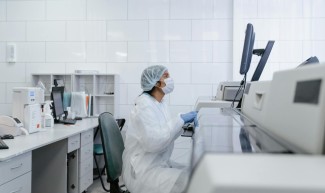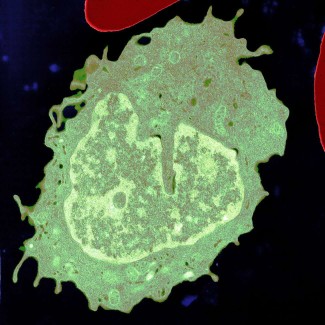MedDay, a biotechnology company centred on disorders of the nervous system and incubated at the Brain and Spine Institute – Institut du Cerveau - ICM, announced today that the main criterion of its pivotal clinical trial MS-SPI was attained. The trial tested the efficacy and the safety of MD1003, a highly concentrated, pharmaceutical quality biotin, taken at a dose of 300 mg per day to treat progressive multiple sclerosis.
The main criterion of the study was the proportion of patients that showed improvement after nine months of treatment and confirmed after 1 year. The results will be presented for the first time during the plenary session on clinical trials, which will take place on Friday, April 24, at noon (local time) at the annual meeting of the American Academy of Neurology (AAN) in Washington D.D.
It is very encouraging the main criterion was reached despite the fact that we placed the bar very high concerning the definition of the response to treatment. The result, which will be announced on April 24, at the AAN, at the same as the supporting analyses and the safety data, suggests that MD1003 could contribute importantly and efficaciously to the treatment of primary and secondary progressive multiple sclerosis.
We have consulted American and European regulatory agencies on the conception of the study and are pleased that the results show improvement in patients with progressive multiple sclerosis after a year of treatment.
The results of the phase III study will be presented on April 24, 2015, at the annual meeting of the AAN during the session on clinical trials.
MS-SPI
MS-SPI is a multicentric, randomized, double-blind, control versus placebo (2:1) study aimed at evaluating MD1003 at a daily dose of 300 mg in patients with progressive multiple sclerosis whose disease had progressed during the two years preceding inclusion in the study. A total of 154 patients with EDSS scores (handicap scale) between 4.5 and 7 were recruited in 16 reference centres for multiple sclerosis in France. The patients were treated for one year. The main criterion of the study was the proportion of patients who showed improvement after nine months of treatment (M9), confirmed after 12 months (m12). Improvement was defined as a decrease in the EDSS score (of at least 1 point for an EDSS score ≤5.5 at the beginning of the study and 0.5 points for an EDSS score ≥6) or an improvement of 20% on the score of the TW25 test (test measuring the rate of walking of the patients over a distance of 25 feet [7.62 m]). The comparison was based on the best EDSS and TW25 scores obtained during selection and randomization of the patients.
The main secondary criteria evaluated the ability of MD1003 to stabilize or slow the progression of the disease. These criteria included the variation of the EDSS score between the beginning of the study and M12, the proportion of patients who improved at M9, confirmed at M12 and the variation of the TW25 score.
Multiple sclerosis is the most frequent incapacitating neurological disease in young adults; the first symptoms generally appear between age 20 and 40 years. In the majority of cases (85%), the patients have an initial relapsing phase, consisting of acute neurological disorders and remissions (RRMS), which generally develops into secondary progressive multiple sclerosis (SPMS) as the disease evolves. Once in the progressive phase, the patients undergo a gradual aggravation of their neurological disorders, which can lead to problems with vision, gait disorders, incontinence, cognitive alterations, fatigue and pain. The primary progressive form of multiple sclerosis (PPMS), characterized by progression of the disease from the start, is less common; it affects 10 to 15% of the patients.
Despite differences in the initial clinical phenotype, the latency period before a certain level of incapacity is reached and the age at which it is reached are the same for patients with PPMS and SPMS. Consequently, recent recommendations propose considering PPMS and SPMS as a single entity, "progressive disease." The global prevalence of patients with progressive disease is estimated to be at least 40% of all patients with multiple sclerosis.
Information on the plenary session and the presentations of results during the 2015 meeting can be found on the website of the AAN.
MD1003
MD1003 is an experimental agent that might both promote myelination and reinforce the supply of energy during transmission of nervous impulses. MD1003 is administered at a dose of 300 mg per day. It is patented in the European Union and the United States for this dose and its use in the treatment of multiple sclerosis. MD1003 is susceptible of acting on two targets related to progressive multiple sclerosis: (1) it activates acetyl-CoA carboxylases (ACC1 and ACC2), enzymes limiting the synthesis of long chain fatty acids required for the synthesis of myelin, and (2) it activates the Krebs cycle in demyelinated axons in order to increase energy production.
The proof of concept of MD1003 was obtained in an open pilot study in 23 subjects with primary and secondary progressive multiple sclerosis. The results were positive; about 90% of the subjects improved over time. The efficacy of the treatment was also evaluated with electrophysiological and magnetic resonance spectroscopic studies. The results were published this year in the Journal of Multiple Sclerosis and Related Disorders.
The Consultative Scientific Council
Prs. Alan Thompson (President, UCL, Royaume-Uni) and Jack Antel (McGill University, Canada), Dr. Robert Fox (Cleveland, United States), Prs. Reinhard Hohlfeld (Munich, Germany), Jean Pelletier (Marseille, France), Per Soelberg Sorensen (Denmark) and Ayman Tourbah (Reims, France, principle investigator of the study).
The Institut du Cerveau - ICM
The Brain and Spine Institute epitomizes a new model for research in the neurosciences. Located in the Pitié-Salpêtrière Hospital in Paris, this unique international research institute (22 000 m2) is at the centre of patient care. Public institutions and donors work hand in hand to bring together patients, physicians and the most eminent researchers from all over the world to work together to find new treatments for diseases of the nervous system.







